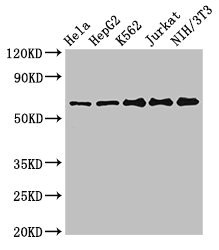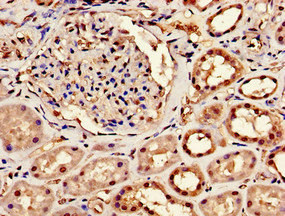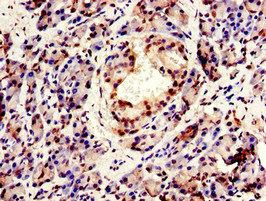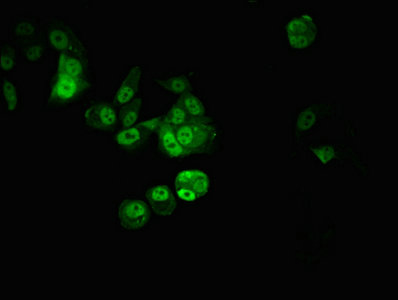Full Product Name
Rabbit anti-Homo sapiens (Human) CPSF6 Polyclonal antibody
Alternative Names
CFIM antibody; CFIm68 antibody; cleavage and polyadenylation specific factor 6; 68kDa antibody; Cleavage and polyadenylation specificity factor 68 kDa subunit antibody; Cleavage and polyadenylation specificity factor subunit 6 antibody; cleavage factor Im complex 68 kDa subunit antibody; CPSF 68 kDa subunit antibody; Cpsf6 antibody; CPSF6_HUMAN antibody; HPBRII 4 antibody; HPBRII 7 antibody; Pre mRNA cleavage factor Im 68 kDa subunit antibody; pre-mRNA cleavage factor I; 68kD subunit antibody; pre-mRNA cleavage factor Im (68kD) antibody; Pre-mRNA cleavage factor Im 68 kDa subunit antibody; Protein HPBRII 4/7 antibody; Protein HPBRII-4/7 antibody
Species Reactivity
Human, Mouse
Immunogen
Recombinant Human Cleavage and polyadenylation specificity factor subunit 6 protein (186-226AA)
Immunogen Species
Homo sapiens (Human)
Conjugate
Non-conjugated
The CPSF6 Antibody (Product code: CSB-PA621966LA01HU) is Non-conjugated. For CPSF6 Antibody with conjugates, please check the following table.
Available Conjugates
| Conjugate |
Product Code |
Product Name |
Application |
| HRP |
CSB-PA621966LB01HU |
CPSF6 Antibody, HRP conjugated |
ELISA |
| FITC |
CSB-PA621966LC01HU |
CPSF6 Antibody, FITC conjugated |
|
| Biotin |
CSB-PA621966LD01HU |
CPSF6 Antibody, Biotin conjugated |
ELISA |
Purification Method
>95%, Protein G purified
Concentration
It differs from different batches. Please contact us to confirm it.
Buffer
Preservative: 0.03% Proclin 300
Constituents: 50% Glycerol, 0.01M PBS, pH 7.4
Tested Applications
ELISA, WB, IHC, IF
Recommended Dilution
| Application |
Recommended Dilution |
| WB |
1:500-1:5000 |
| IHC |
1:20-1:200 |
| IF |
1:50-1:200 |
Storage
Upon receipt, store at -20°C or -80°C. Avoid repeated freeze.
Lead Time
Basically, we can dispatch the products out in 1-3 working days after receiving your orders. Delivery time maybe differs from different purchasing way or location, please kindly consult your local distributors for specific delivery time.
Usage
For Research Use Only. Not for use in diagnostic or therapeutic procedures.










